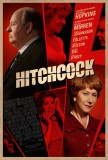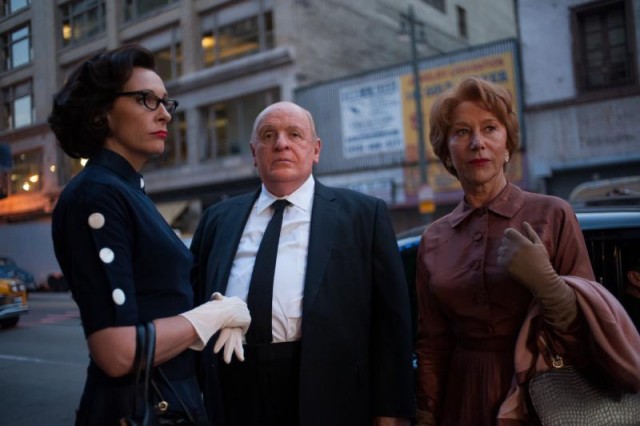Hitchcock Film Review
 |
Hitchcock
Theatrical Release: November 23, 2012 / Running Time: 98 Minutes / Rating: PG-13 Director: Sacha Gervasi / Writers: John J. McLaughlin (screenplay), Stephen Rebello (book Alfred Hitchcock and the Making of Psycho) Cast: Anthony Hopkins (Alfred Hitchcock), Helen Mirren (Alma Reville), Scarlett Johansson (Janet Leigh), Danny Huston (Whitfield Cook), Toni Collette (Peggy Robertson), Michael Stuhlbarg (Lew Wasserman), Michael Wincott (Ed Gein), Jessica Biel (Vera Miles), James D'Arcy (Anthony Perkins), Richard Portnow (Barney Balaban), Kurtwood Smith (Geoffrey Shurlock), Ralph Macchio (Joseph Stefano), Kai Lennox (Hilton Green), Tara Summers (Rita Riggs), Wallace Langham (Saul Bass), Paul Schackman (Bernard Herrmann) |
Preorder Hitchcock from Amazon.com: Blu-ray + DVD + Digital Copy
Recent years have given us cinematic depictions of some of the most significant film directors in history: Georges Mιliθs in Hugo, Laurence Olivier in My Week with Marilyn, Orson Welles in Me and Orson Welles. Now, perhaps the greatest director of all and certainly one of the most revered gets his turn in Hitchcock. IMDb's character page establishes this as the nineteenth portrayal of the legendary British filmmaker. In a good deal of make-up, Anthony Hopkins claims the title role. The timing of the performance and Hitch's figurative weight make it perfectly natural to speculate on the possibility that Hopkins adds another Academy Award to his win for The Silence of the Lambs. He will not, but he could stay in the discussion and very well might pick up a Golden Globe nomination, although that would be more easily achieved with the studio fudging its way into Comedy or Musical classification. That does not appear to be the film's plan, but then that plan only took shape two months ago, when Fox Searchlight surprised everyone by announcing this as a last-minute entry to 2012's award season.
Rather than opting for the breadth of a traditional biopic, Hitchcock focuses on the production of the director's best-known film, Psycho. 1959 would seem to be when Hitchcock was at his peak. His anthology television series "Alfred Hitchcock Presents" had just begun airing its fifth season on CBS. His Hollywood films were events, sold on his familiar brand. His latest thriller, North by Northwest, was well-reviewed and well-attended. It seems like Hitchcock then would be like Steven Spielberg anytime in the past thirty years, free to do anything and everything he wanted. This film tells us otherwise.
In trying to find a suitable next project for himself that isn't overtly in his wheelhouse, Hitch comes upon Robert Bloch's novel inspired by the grisly crimes of Wisconsin serial killer Ed Gein. Hitch has his receptionist (Toni Collette) see to it that every copy of the novel is bought, ensuring that his Psycho will arrive with mystery and unforeseen twists. The director's plan to make a great horror movie is met with reluctance from his then home studio, Paramount Pictures. The studio's president Barney Balaban (a fine Richard Portnow) will not sign off on something so macabre, but he does agree to the seemingly radical proposal pitched by Hitch's agent (Michael Stuhlbarg): Psycho will be an independent production merely distributed by Paramount.
And so, Hitchcock sets out to make what would be the last of his bona fide masterpieces. Hitchcock establishes Alma Reville (Helen Mirren), the director's wife of over thirty years, as a driving force in his life. She isn't just his muse, but a hands-on collaborator. When Hitch needs a day off, Alma fills in for him, strutting onto the set and coolly giving specific, knowledgeable orders. Hitchcock is as much about the director's marriage as it is about Psycho. That gives the movie a human touch and renders Mirren even more of an Oscar contender than Hopkins. But it also stands in the way of this being the film you want it to be.
The Hitchcocks' marital drama feels heavily fictionalized while somehow remaining mundane. Alma fears she can't compete with the young blonde leading ladies her husband famously casts. I assume that the source text, Stephen Rebello's 1990 book Alfred Hitchcock and the Making of Psycho, documents these fears of infidelity. Even so, Hitchcock deserves better than a tale of a 60-year-old couple's marital bonds being tested. He also deserves better than consulting with an imaginary friend, the serial killer Ed Gein, in a design that reminds one of The Iron Lady's irreverence. Hitchcock at least has a sense of humor about this, casting the ghastly Gein as Hitch's silent therapist and advisor. Still, that invention by screenwriter John J. McLaughlin (Black Swan) grinds the film to a halt at every usage.
Hitchcock illustrates a few reasons why it's taken this long to get a non-documentary about The Master of Suspense. Firstly, there is the larger than life personality whose television introductions, trailers, and cameos made as well-known as any director. Even physically, Hitch is like no one else. The production does an admirable job of trying to recreate his distinct appearance, but somehow you always see Anthony Hopkins in make-up, his jowls clearly fabricated. The film's heavy technical demands elevate it to the top of the pack for the Best Makeup and Hairstyling Oscar (as that category is now known), but the transformation is just so in-your-face that the efforts are easier to notice than celebrate.
The other explanation why we haven't gotten a movie about Hitchcock until now is that there just doesn't seem to be an especially compelling story to tell. Biographical films can't be all rise. There's got to be some fall. But Hitch's career is just a string of success, followed by more success, giving way to still more success. No one can blame Sacha Gervasi, the writer and producer making his narrative feature directorial debut, for not wanting to tell that story. Nonetheless, the conflict he presents instead is underwhelming and contrived. The slight bumps in the road of Alfred and Alma's marriage, which lasted until his 1980 death, aren't interesting enough to take away from the Psycho production bits that amount mainly to teases.
Hitchcock is entertaining enough, but it's all too easy to see a much better film coming from this cast and footage. You expect a lot from something aiming to detail cinema as historic as Psycho and this film lacks the weight that My Week with Marilyn drew from The Prince and the Showgirl, let alone what Ed Wood earned from atrocious B movies.
Preorder Hitchcock from Amazon.com: Blu-ray + DVD + Digital Copy
|
Related Reviews:
DVDizzy.com | DVD and Blu-ray Reviews | New and Upcoming DVD & Blu-ray Schedule | Upcoming Cover Art | Search This Site
In Theaters: Life of Pi Rise of the Guardians | Written by John J. McLaughlin: Black Swan
Anthony Hopkins: Nixon You Will Meet a Tall Dark Stranger The Rite Thor Proof
Helen Mirren: The Queen The Last Station Arthur Inkheart National Treasure: Book of Secrets
Directed by Alfred Hitchcock: North by Northwest To Catch a Thief Rebecca The Lady Vanishes The 39 Steps
Ed Wood My Week with Marilyn Sunset Blvd. Hugo The Iron Lady Despicable Me Disturbia The Rum Diary Nine
Scarlett Johansson: We Bought a Zoo The Prestige The Other Boleyn Girl | Jessica Biel: Next I'll Be Home for Christmas
Danny Huston: Magic City: The Complete First Season | Michael Stuhlbarg: A Serious Man | James D'Arcy: Brideshead Revisited


